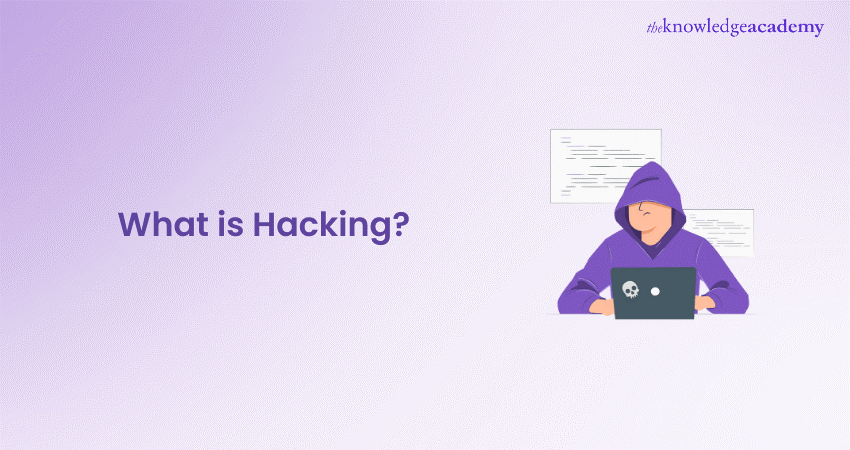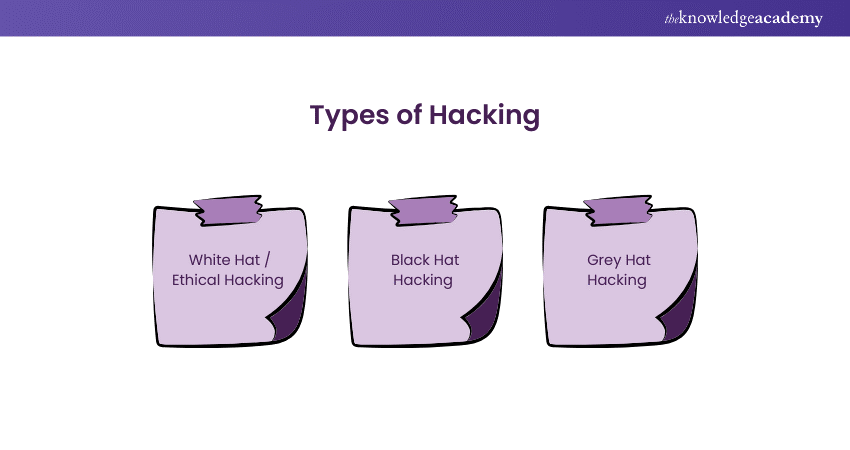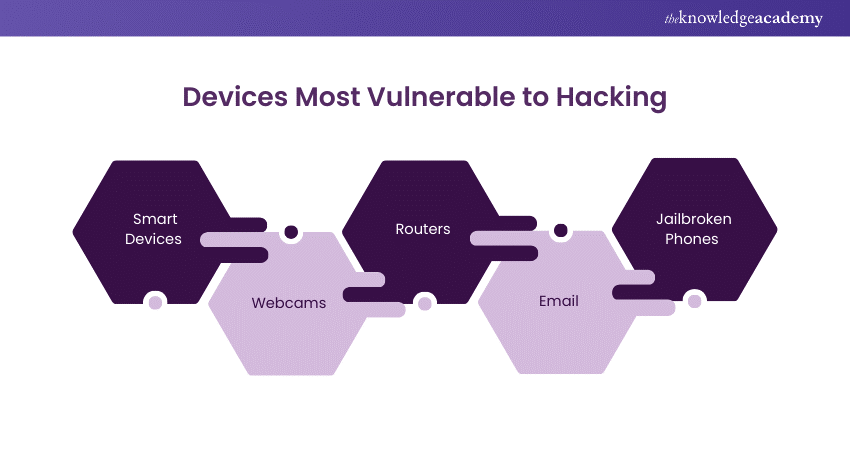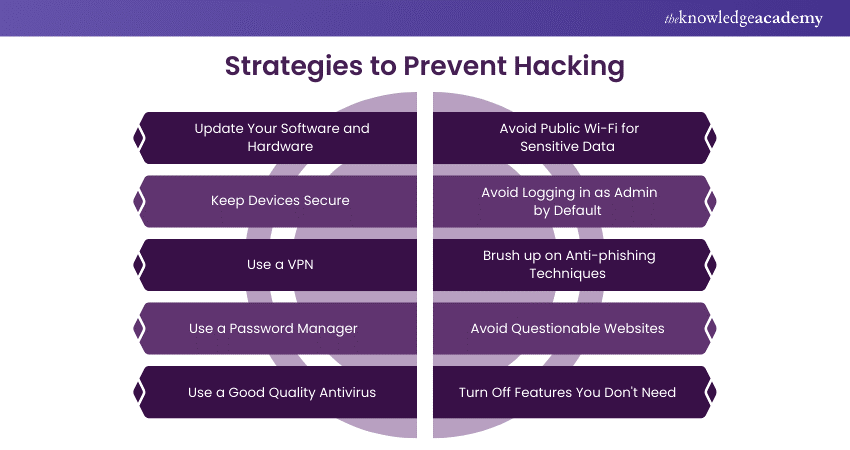We may not have the course you’re looking for. If you enquire or give us a call on +44 1344 203 999 and speak to our training experts, we may still be able to help with your training requirements.
Training Outcomes Within Your Budget!
We ensure quality, budget-alignment, and timely delivery by our expert instructors.

In a world where digital interactions are integral to our daily lives, the concept of Hacking often sparks curiosity and concern. But What is Hacking, really? It encompasses both the positive efforts of Ethical Hackers who enhance our security and the harmful actions of cybercriminals who exploit vulnerabilities.
So, what happens when someone hacks a system? More importantly, how can we protect ourselves? The key lies in awareness and prevention. Understanding What is Hacking and how to counter it can safeguard your personal and professional data. Let's look at various types of Hacking and the precautions you may take to keep your systems secure.
Table of Contents
1) What is Hacking?
2) Types of Hacking
3) The Most Hacker-Prone Devices
4) How Much Harm Can Hackers Cause?
5) Historic Cyberattacks and Hackers
6) How to Prevent Hacking?
7) Conclusion
What is Hacking?
Hacking occurs when an individual exploits vulnerabilities in a computer system or network in order to achieve unauthorised access or control. Hackers employ different strategies to breach security systems, swipe confidential data, or interrupt services. Nevertheless, not all Hacking is against the law; some hackers aim to discover weaknesses and enhance security.
As technology progresses, Hacking methods are becoming increasingly intricate. It is essential for individuals and organisations to remain knowledgeable about the most recent techniques and strategies to safeguard themselves.
Types of Hacking
Hacking can be divided into several categories based on the intent and legality of the actions. Here are the three main types of Hacking:

1) White Hat / Ethical Hacking
White Hat hackers, or Ethical Hackers, utilise their skills for both defence and beneficial purposes. Here’s what they do:
1) Purpose: Use Ethical Hacking skills for good, focusing on improving security.
2) Employment: Hired by companies or governments to identify and fix vulnerabilities.
3) Actions: Perform controlled Hacking attempts to reveal weaknesses before malicious hackers can exploit them.
4) Impact: Help organisations strengthen their Cyber Security defences.
2) Black Hat Hacking
Black hat hackers are considered the "bad guys" of the Hacking community. They participate in illegal actions to either cause harm or gain financially. Their characteristics include:
1) Purpose: Engage in illegal activities with malicious intent.
2) Targets: Exploit system vulnerabilities for financial gain, theft, or to cause harm.
3) Focus: Often targets personal information, intellectual property, or financial data.
4) Outcome: Sell stolen data on the dark web or exploit it for identity theft and fraudulent activities.
3) Grey Hat Hacking
Grey hat hackers are positioned between white hat and black hat hackers. Here is what makes them different:
1) Purpose: Operate between ethical and malicious Hacking.
2) Actions: Exploit security weaknesses without permission but without harmful intent.
3) Objective: Increase knowledge about weaknesses, occasionally through the disclosure of flaws.
4) Consequences: This could result in legal problems, as unauthorised Hacking is still against the law, even if no harm is intended.
Unlock professional Ethical Hacking skills and elevate your career in the Cyber Security field with our Ethical Hacking Professional – sign up today!
The Most Hacker-Prone Devices
Certain devices are more susceptible to Hacking than others. Hackers often focus on gadgets that store sensitive data or have less robust security features.

1) Smart Devices
a) Target: Smartphones and IoT devices.
b) Vulnerability: Android devices are more exposed due to open-source and inconsistent software development.
c) Risk: Data theft, corruption, and exploitation of weak IoT security.
2) Webcams
a) Target: Built-in webcams on computers.
b) Vulnerability: Easily compromised through Remote Access Trojans (RAT).
c) Risk: Spying, reading messages, monitoring browsing, and hijacking webcams.
3) Routers
a) Target: Internet routers.
b) Vulnerability: Hackers can intercept data and access connected devices.
c) Risk: DDoS attacks, DNS spoofing, cryptomining, and data interception.
4) Email
a) Target: Email accounts.
b) Vulnerability: Propagation of malicious software, ransomware, and phishing attempts.
c) Risk: Stealing sensitive data, sharing harmful links, and infecting systems.
5) Jailbroken Phones
a) Target: Phones with jailbroken operating systems.
b) Vulnerability: Removal of official security measures.
c) Risk: Data theft, manipulation of the device, and attacks on connected networks.
Elevate your Ethical Hacking abilities by Mastering Metasploit Framework Course and staying ahead of cyber threats today!
How Much Harm Can Hackers Cause?
Cyber Security breaches can lead to significant disruption and harm. Once hackers gain access to your data or devices, they can:
a) Steal your money and open credit card or bank accounts in your name
b) Damage your credit score by making unauthorised transactions
c) Request new PINs or credit cards, enabling further fraud
d) Make purchases on your behalf, draining your accounts
e) Add themselves as authorised users to your accounts for easier access to credit
f) Obtain cash advances, leaving you with the debt
g) Exploit your Social Security number for identity theft and fraud
h) Sell your personal information to others for malicious use
i) Delete or corrupt important files on your devices
j) Leak sensitive personal data or threaten to do so for extortion purposes
Learn to identify vulnerabilities and secure networks with the Certified Penetration Testing Professional Certification Course today!
Historic Cyberattacks and Hackers
Here are some of the most significant cyberattacks and infamous hackers who left a lasting mark on digital history:
1) The 414s
a) Timeframe: Early 1980s
b) Targets: Los Alamos National Laboratory, Sloan-Kettering Cancer Center
c) Impact: Motivated the US Congress to pass the Computer Fraud and Abuse Act, making malicious Hacking a crime.
2) The Morris Worm
a) Timeframe: 1988
b) Creator: Robert Tappan Morris
c) Impact: Forced thousands of computers offline, caused an estimated £7.6 million in damages.
d) Significance:
Morris was the first person punished under the Computer Fraud and Abuse Act.
3) Colonial Pipeline
a) Timeframe: 2021
b) Method: Ransomware attack
c) Impact: Temporarily shut down the pipeline, which supplies 45% of the US East Coast's petroleum.
d) Outcome: Colonial Pipeline paid a ransom of £3.34 million to regain access to its data.
4) Change Healthcare
a) Timeframe: 2024
b) Impact: Massive data breach disrupting billing systems across the US healthcare industry.
c) Data Compromised: Personal data, payment details, and insurance records for millions of people.
d) Estimated Costs: Potentially affected up to one-third of all Americans, with costs reaching £760 million.
Master advanced Hacking techniques and safeguard digital assets with our Certified Ethical Hacker Certification Course today!
How to Prevent Hacking?
Here are several steps to keep your devices and networks secure:

1) Update Your Software and Hardware
a) Regularly update software and hardware to install security patches.
b) Security updates fix vulnerabilities that hackers can exploit.
2) Keep Devices Secure
a) Make sure to create secure passwords and always lock your devices when they are not being used.
b) Stop unauthorised entry, regardless of whether your device is taken.
3) Use a VPN
a) VPNs encrypt your internet connection, making it harder for hackers to intercept data.
b) This is crucial while using public Wi-Fi networks, which are prone to Hacking.
4) Use a Password Manager
a) Password managers generate and store complex, unique passwords.
b) Decreases the risk of using weak or repetitive passwords that are easy to hack.
5) Avoid Public Wi-Fi for Sensitive Data
a) Don't access personal or financial data on unsecured public Wi-Fi.
b) Public networks are often targets for data interception.
6) Use a Good Quality Antivirus
a) Set up efficient antivirus software to defend against malware, viruses, and various other threats.
b) Make sure to consistently update your antivirus software to protect against emerging threats.
7) Avoid Logging in as Admin by Default
a) For day-to-day tasks, use a regular user account.
b) This limits the damage hackers can cause if they gain access.
8) Brush up on Anti-phishing Techniques
a) Phishing attacks confuse users into disclosing sensitive data.
b) Stay cautious of suspicious emails, links, or requests for personal data.
9) Avoid Questionable Websites
a) Avoid visiting websites known for hosting malware or harmful content.
b) Check for 'https://' in URLs to ensure a secure connection.
10) Turn Off Features You Don't Need
a) Disable features like remote access or Bluetooth when not in use.
b) Reduces entry points for potential hackers.
Master Ethical Hacking and safeguard businesses against cyber threats with our Ethical Hacking Training – join now!
Conclusion
Understanding What is Hacking empowers you to take control of your digital safety. By staying informed about different Hacking methods and adopting strong security practices, you can safeguard your personal and professional data. Take charge of your online safety and confidently defend against potential cyber threats.
Master Malware And Memory Forensics Training to enhance your Cyber Security skills and protect critical systems.
Frequently Asked Questions

Unauthorised access to computers or networks for malicious purposes, like theft of data or causing harm, can lead to illegal Hacking. However, Ethical Hacking, done with permission to improve security, is legal. The legality depends on the hacker’s intent and actions.

If you suspect your account has been breached, promptly disconnect from the web, modify all your passwords, upgrade your security tools, and monitor for any strange behaviour. To receive additional assistance, contact a cybersecurity expert or your IT department.

The Knowledge Academy takes global learning to new heights, offering over 30,000 online courses across 490+ locations in 220 countries. This expansive reach ensures accessibility and convenience for learners worldwide.
Alongside our diverse Online Course Catalogue, encompassing 19 major categories, we go the extra mile by providing a plethora of free educational Online Resources like News updates, Blogs, videos, webinars, and interview questions. Tailoring learning experiences further, professionals can maximise value with customisable Course Bundles of TKA.

The Knowledge Academy’s Knowledge Pass, a prepaid voucher, adds another layer of flexibility, allowing course bookings over a 12-month period. Join us on a journey where education knows no bounds.

The Knowledge Academy offers various Ethical Hacking Training, including Ethical Hacking Professional and Mastering Metasploit Framework. These courses cater to different skill levels, providing comprehensive insights into Ethical Hacking.
Our IT Security & Data Protection Blogs cover a range of topics related to Hacking, offering valuable resources, best practices, and industry insights. Whether you are a beginner or looking to advance your IT Security & Data Protection skills, The Knowledge Academy's diverse courses and informative blogs have got you covered.
Upcoming IT Security & Data Protection Resources Batches & Dates
Date
 Ethical Hacking Professional
Ethical Hacking Professional
Thu 2nd Jan 2025
Thu 1st May 2025
Thu 4th Sep 2025
Thu 20th Nov 2025







 Top Rated Course
Top Rated Course



 If you wish to make any changes to your course, please
If you wish to make any changes to your course, please


